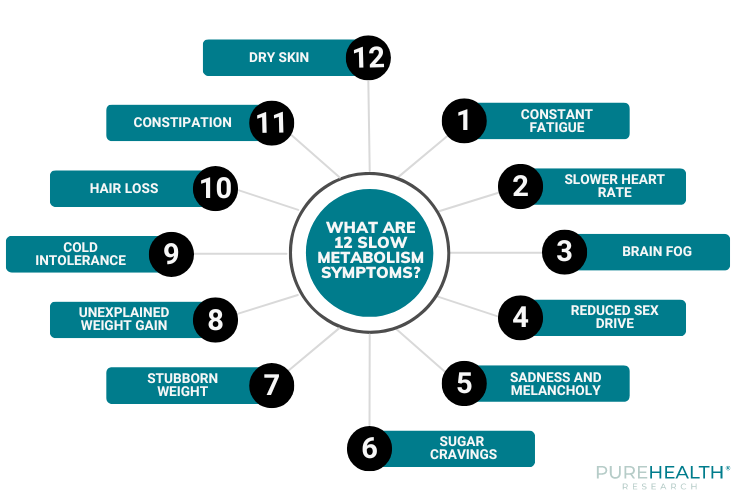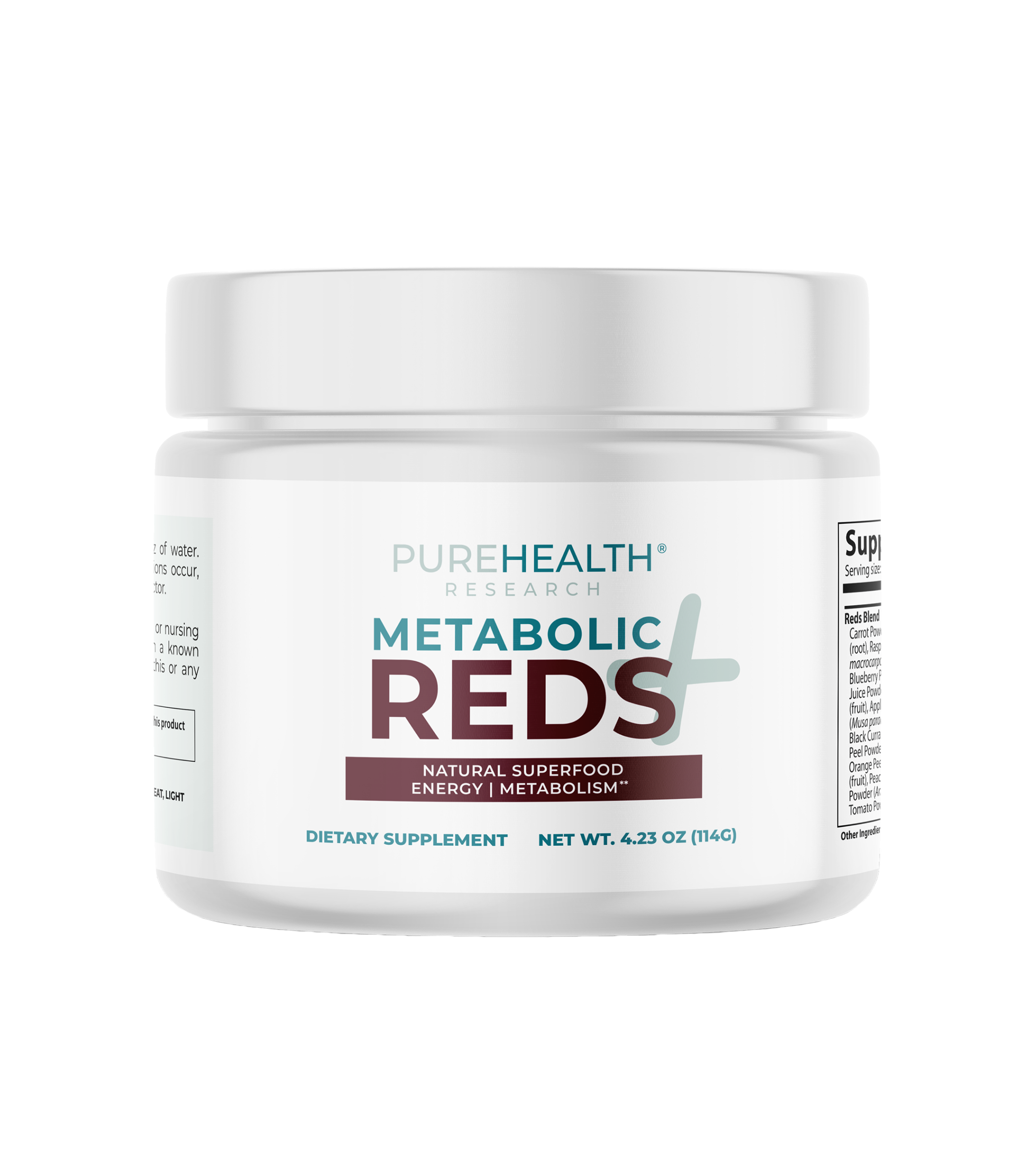12 Slow Metabolism Symptoms
Discover the truth about slow metabolism symptoms and how to fix them. From brain fog to reduced sex drive, our guide here will help you unravel this issue.


What exactly are slow metabolism symptoms? How they differ from the signs of fast metabolism? Before we dive in, answer these questions. Have you been trying to drop your excess weight consistently but failing despite following a strict regimen that has worked for others? Does your weight sometimes shock you because it keeps increasing even though you’re always mindful of what you eat? Do you easily feel exhausted after any activity and prefer to sit or lie around, making others perceive you as lazy or inactive? If you answered yes to all three, you’re likely struggling with a slow metabolism and stumbled on the right page.
The metabolic process is a chemical reaction that converts compounds such as glucose or calories into energy within your body. Therefore, with a slow metabolism, the process takes place at a much slower pace, causing many inefficiencies that could lead to symptoms like fatigue, slower heartbeat, brain fog, lower sex drive, and sadness or dark moods, among others. So, if you know there’s no underlying health or thyroid condition at the root to manage first, what do you do if your metabolic rate is low?
Slow Metabolism Symptoms
If your body converts food into energy at a slow speed, your body will naturally store some as fat and you will likely gain weight. A slow metabolism means your liver and muscles will fill up with excess glucose it can’t use immediately, so it is converted into stored fat, leading to weight gain.

Other slow metabolism symptoms to look out for is constant fatigue due to the low energy levels in your body. A body with slow metabolism does not convert enough glucose into energy, hence the feeling of tiredness. If your energy levels are always low and you frequently crave sugary things, this could indicate that your body is not obtaining enough energy from the food you eat.
Luckily, you can improve your body’s energy production efficiency by having a well-balanced diet and applying the required lifestyle changes. It may sound counterintuitive because you lack energy, but increasing your activity level will also increase your energy levels. Start slow, even sitting in a chair and waving your arms, dance around your living room, or walk around the block until you build up the fortitude for more.
And stay consistent with activity, even if your health restricts you to low impact, it’ll make a significant difference in your overall well-being. In addition, keep yourself hydrated throughout the day to ensure your body’s metabolism works at its finest.
A slow metabolism could lead to a variety of problems, so being on high alert for its many symptoms is a good idea if you want to avoid health complications later in your life. Here are some low metabolism symptoms that you need to look out for.
1. Constant Fatigue
Would you describe your nature as lethargic or always tired, even after a meal? If you constantly have to rely on energy drinks or sweet foods to boost your energy, then you likely just have a slow metabolism. Just think back to all those times people thought you were lazy because you weren’t feeling active and instead felt groggy or sleepy. Well, now you know that there is nothing strange or weird about you. As it turns out, your body just doesn’t produce energy at the same rate as other people.
The constant fatigue you feel is due to depleted levels of adenosine triphosphate (ATP), according to a study published on PubMed. ATP is the compound responsible for producing energy for various cellular processes, thereby affecting the functioning of muscles when it’s in low production. This inefficient production then leads to low blood sugar levels and the feeling of fatigue.
2. Slower Heart Rate
Another one of slow metabolism symptoms associated with a slow metabolic system is a slower heart rate. However, some people can still have a normal metabolic system and a slower heart rate due to other underlying ailments. Therefore, if your heartbeat rate is lower than 60 to 100 beats per minute, we recommend checking with your physician first.
If your body system is dealing with a slowed metabolism, it could mean that various body parts are not functioning efficiently due to low energy levels. When this happens, your muscles don’t have sufficient energy to contract and compress blood vessels aiding in the transport of blood and oxygen throughout your body. Hence, your pulse rate will decrease to try and save more energy.
Moreover, a reduced heart rate leaves you feeling lightheaded and dizzy, which can be dangerous if you’re driving or operating machinery at work. Additionally, you may feel chronic fatigue and experience other medical conditions such as an abnormal heart rhythm.
Although it’s possible to improve energy levels and muscle efficiency and even help regulate your heart rate, ensure that you first stop by your doctor’s office to check for any underlying medical conditions related to the heart. After all, checking with an expert on the matter to have an accurate diagnosis should always come first.
3. Brain Fog
Brain fog is one of commonly overlooked symptoms of slow metabolism. Do you know that feeling where you struggle to focus and can’t help but feel fuzzy and confused? That is brain fog. One cause is a slow metabolism, which struggles to produce enough energy to power the neurons in your brain. When this happens, it limits the brain’s ability to function correctly due to a low energy supply, thereby affecting your cognitive performance.
When dealing with brain fog, you’ll find it hard to retain memory, and even the simplest of tasks can feel really challenging. Brain fog may result from one or several factors, such as:
- Chronic inflammation
- An imbalance in insulin levels
- Increased oxidative stress
- An imbalance in cortisol levels
If you want to mitigate the complications of brain fog and maintain your brain’s health, we recommend taking brain-supporting supplements, vitamin B, and omega-3 fatty acids. Additionally, eating a healthy diet, optimizing sleep quality, and regularly working out can help banish brain fog and promote mental clarity. So, instead of staying indoors all day long, whether at school, work, or home, take a break and go for that much-needed jog. A simple 30-minute run can help clear your mind.
4. Reduced Sex Drive
It’s incredible how metabolism plays a vital role in regulating body functions like hormone balance, which can affect our sexual health. If you’ve been experiencing a drop in libido lately, combined with lethargy, increased sugar cravings, and weight gain, then you’re likely dealing with a slowed metabolism. But how is metabolism connected to your sex drive?
A slowed metabolism can cause your body to experience hormonal imbalances, decreasing male hormone production that fuels the male sex drive. As these hormones drop, physical arousal, sexual fantasies, and sexual performance diminish.
Slowed metabolism reduces the production of sexual hormones, making you feel less inclined to engage in sex. Additionally, a slowed metabolism can lead to chronic stress, which also decreases your desire for sex and impacts your emotional well-being negatively.
If this sounds like one of your slow metabolism symptoms, you need to take action to improve your sex drive, vitality, and overall quality of life. Also, ensure that you get enough quality sleep each night to influence your metabolic system positively.
5. Sadness and Melancholy
The chronic dark mood disorder of melancholy and sadness is a mental condition that can affect one’s life quality and emotional well-being. According to a research article published in JAMA Psychiatry, it can manifest as a symptom of a slowed metabolism. So, how exactly is metabolism connected to dark moods? As mentioned earlier, this process is the one responsible for various body processes, such as regulating neurotransmitters in the brain.
Neurotransmitters consist of chemicals like norepinephrine, serotonin, and dopamine, which are all in charge of controlling our moods. When you have a slow metabolism, these neurotransmitters become imbalanced and deficient, leading to mood changes that result in melancholy symptoms. Additionally, metabolism also influences the production of hormones such as sex and thyroid hormones, which also regulate your moods.
If you have an imbalance of these hormones due to a slowed-down metabolic system, your mood will be negatively affected. This reason is why people who struggle with this problem are often encouraged to incorporate a healthy diet, regular exercise, and lead an active social lifestyle (without alcohol), all of which are tips to help boost metabolism. Therefore, if you’ve been feeling down lately, maybe you just need to take foods rich in zinc and B vitamins and add a little regular workout into your daily life.
6. Sugar Cravings
One of the unique symptoms of slow metabolism is the craving for sugar. To some people, the sugar craving is so persistent that it drives them to unhealthy eating habits that inevitably lead to weight gain. Over the years, scientific research has revealed that a sluggish metabolic system can contribute to developing a sweet tooth. When energy conversion is low within your body, it will send signals to your brain to look for quick alternatives for energy so that it can keep functioning properly.
If this happens, you will instantly feel sugar cravings and find yourself heading to the nearest dessert shop to give yourself a sweet treat. On top of that, a low metabolic system can make you respond poorly to blood sugar’s hormones. This kind of hormone resistance means sugar keeps rising in your bloodstream and doesn’t enter your cells and starves your body of energy i, triggering you to crave sweet foods for an injection of instant energy.
Unfortunately, this causes a feedback loop of futility, encouraging you to consume even more sugary foods, which in turn makes your cells more resistant. And the excess sugar hormone in your bloodstream converts the sugar into fat. Sooner or later, you’ll find yourself trapped in a vicious cycle of sugar cravings and weight gain.
Moreover, there are appetite-influencing hormones that the metabolism influences. A low metabolic rate can affect the performance of hormones like serotonin and leptin, increasing your hunger for sugary foods. If you want to minimize some of your sugar cravings, consider taking foods rich in healthy fats and protein.
7. Stubborn Weight
Weight-related problems are some of the most well-known slow metabolism symptoms. Have you been trying to shed some pounds, yet you always fail? Perhaps you’ve endured a strict diet and followed a serious and consistent workout routine, but you’ve barely shed any weight after weeks or months of trying. And when you do manage some success, you regain it very quickly. If this has been your challenge, then a slow metabolism may be your secret opponent.
Why is it quite challenging to lose weight with a slow metabolic system? It happens because of the butterfly effect. A slow metabolism leads to hormonal imbalances, which in turn cause blood sugar hormone resistance. As mentioned previously, once your body fails to transport glucose into your cells as fuel for energy production, it converts the excess sugar in your bloodstream into stored fat instead.
Also, belly fat is associated with increasing levels of cortisol, which slows your metabolism further. Whenever this happens, it inevitably leads to the development of chronic stress, which causes your body to accumulate more fat in the abdominal area in a seemingly never-ending cycle.
8. Unexplained Weight Gain
Another weight problem you can experience with a slow metabolism symptoms is weight gain that’s hard to account for, according to a study by the International Journal of Obesity and Related Metabolic Disorders. Imagine doing your best to lead a healthy lifestyle by avoiding junk food, sticking to a ketogenic diet, and going to the gym every other week, only to end up gaining weight despite your hard efforts. It’s definitely a frustrating experience to go through, especially if you can’t track what is causing it.
If you’ve been dealing with unexplained weight gain, then perhaps you need to pay more attention to your metabolism because it could be slow. Since metabolism helps your body to convert the food you eat into energy, your body will not be able to burn enough calories if it’s not working efficiently. Therefore, you end up storing all the excess energy you get from food as fat instead of burning it, causing you to increase your weight.
Also, if you have hormonal imbalances, your body could become resistant to leptin, affecting the ability of your brain to register when you’ve eaten your fill. As a result, you could overeat without meaning to and add more weight. This leads to another critical question: can obesity cause shortness of breath? Indeed, as body weight increases, the lungs must work harder to supply oxygen, which can result in breathlessness. This respiratory strain may further complicate the ability to engage in regular physical activity, perpetuating the cycle of weight gain and health decline.
9. Cold Intolerance
How to know if you have a slow metabolism? One major sign is the inability of your body to resist cold. Although other conditions can also cause cold sensitivity, you’ll realize that your body generates little heat if your metabolic system has slowed down. As a result, the little heat your body produces will not be enough to fight off the cold. Additionally, if your thyroid gland does not produce enough hormones, your body will experience decreased metabolism, making you more susceptible to feeling cold.
The inability to sustain body heat reduces blood circulation, preventing warmth from reaching certain areas of your body, such as the feet and hands, which are usually more exposed to the cold. If your body has a slow metabolism, you might suffer from insufficient fat insulation, leading to improper fat distribution and protection from the cold. As a result, you may constantly feel chilly no matter how many clothes you put on top.
10. Hair Loss
Losing hair is irritating. It affects your self-esteem because it’s usually the first thing people notice. Since metabolism affects hair growth, it’s common to lose hair if your metabolic system slows down. Hair loss can occur due to a slowdown of this process, affecting the nutrients and hormones required for hair growth. If your hair follicles receive less oxygen and nutrients, then they won’t have enough resources to function and grow well. Some of the hair follicles might even grow weak and die.
Moreover, if the thyroid gland is under-active, it will produce very few hormones required for hair growth, making you lose a lot of hair. In other cases, the sluggish metabolism can weaken the ability of your body to absorb specific nutrients such as vitamin E, zinc, vitamin D, iron, and biotin, which play a significant role in hair growth.
Therefore, perhaps your hair loss issue has nothing to do with the type of hair products you use. Instead, we recommend you try to optimize your nutrient intake, get enough sleep, and work out regularly. Also, check with your doctor whether you have any ailment that could cause hair loss.
11. Constipation
Constipation refers to infrequent bowel movements or the inability to pass stool smoothly, which can be a very uncomfortable experience. How is constipation linked to slow metabolism? Well, metabolism helps to regulate the digestive functions that take place in the gut.
If your metabolism rate is low, your stomach won’t process the food you ingest quickly, and waste will take too long to be eliminated from your body. Therefore, the stool will experience delay as it moves through the intestines, resulting in constipation.
Another effect of a sluggish metabolic system is reduced contraction of muscles along the digestive tract as the food is propelled forward. These decreased contractions will also slow down the stool as it moves in the intestines, leading to prolonged retention, which can cause constipation.
Therefore, if you want to fight against constipation in your body, ensure that you eat high-fiber fruit, vegetables, whole grains, and fermented foods like plain Greek yogurt, kefir, or sauerkraut.
Moreover, drinking plenty of water will help your stool to remain soft as it moves through the intestines. We also recommend participating in frequent physical activities because these will enhance your bowel movement.
Suppose you want to have a pleasant experience whenever you visit someone. In that case, you’ll need to not only take part in regular exercises and drink plenty of water, but you may also want to enhance the growth of good bacteria in your gut and intestines. Doing so helps ensure a smoother digestion and nutrient absorption process, facilitating your bathroom visits later down the road.
12. Dry Skin
Metabolism influences so many areas of our bodies, and our skin health is not exempt. A slow metabolism can affect the production of important substances, leaving you with dry skin.
For instance, a slow metabolic process can decrease the amount of sebum produced, which is responsible for keeping your skin moisturized. Since sebum acts as the skin’s lubricant, its inadequate production will affect your skin’s moisture balance.
More so, a decreased metabolism can slow down your skin’s process to renew its cells, causing more dead cells to build up on the surface. In return, your skin becomes unable to retain its own moisture and becomes dry and flaky.
As mentioned earlier, a slow metabolism also hinders your body’s ability to utilize essential nutrients. Some of these nutrients are necessary for the health of your skin, such as vitamins E, A, and C. These vitamins help your skin maintain its natural elasticity.
Therefore, your best bet for improving your skin health is by taking a vitamin-rich supplement, which can significantly improve your complexion and nourish your dermis. In addition, eating a balanced diet and drinking a lot of water can be a game changer for your skin.
How to Fix Slow Metabolism?

If you’re thinking of ways on how to reset your metabolism, then we’ve got you covered. Whenever this process works slower than usual, it can affect many aspects of your life if you don’t take the required steps to change it. It can impact your emotional well-being and make you feel down and melancholy by affecting the neurotransmitters in your brain.
Additionally, a sluggish metabolism can leave you with severe cravings for sugar, making you consume a lot of unhealthy junk food. Then, your system might fail to digest all the glucose and convert some of it into fat, causing you to gain weight unexpectedly.
It’s like slow metabolism is an enemy that fights you from within. So, how do you boost it? Below are ways to do so.
Eating Protein-Rich Foods
Unlike carbohydrates converted into energy and later fat by a slow metabolism, proteins build and repair tissues after being broken down into amino acids. The process of breaking down proteins to build tissues is called protein synthesis. Since this process requires energy to function, it will help boost your metabolism.
Additionally, proteins have a high thermic effect on food compared to fats or carbohydrates, meaning your body will burn more calories when digesting, absorbing, and processing proteins. And since it takes longer for your body to process protein than carbs, you’ll feel fuller longer and get fewer cravings. Therefore, if you add foods rich in proteins to your diet, you could potentially increase your rate of metabolism.
Being Well Hydrated
Drinking as much water as possible is another simple and affordable way to boost a slow metabolism. Water plays a vital role in numerous metabolic processes, including transporting nutrients, regulating body temperature, and eliminating waste from the body. Being well-hydrated ensures that all the metabolic processes in your body occur smoothly.
Also, if you want to prevent yourself from overeating, drinking water can help substitute hunger. In fact, sometimes people eat food when they’re thirsty, thereby adding more calories to their bodies. Drinking plenty of water can help you deal with weight-related concerns that could originate from a faulty metabolism.
Keeping Up With Regular Exercise
Exercising is a practical way to increase your metabolism because you also get to burn calories. Furthermore, working out makes you build lean, active muscles that burn more calories than fat tissues. This approach is great because constant exercise can help increase muscle tissue metabolism while stimulating protein synthesis, ensuring the proper repair of your growing muscles.
Moreover, working out helps your body improve the sensitivity of glucose hormone receptors to transport glucose into cells and fuel energy production more efficiently. Doing this helps you better manage your blood sugar levels, unwanted weight gain, and improve metabolic activities in your body.
Avoid Foods That Slow Metabolism
When dealing with a sluggish metabolism, it’s best to eat foods that boost this process instead of foods that slow it down. Are you cautious about what you eat? Here is a list of things you can try if you want to boost a slow metabolism. It includes:
- Vegetables rich in carotenoids, e.g., mangoes, carrots, and pumpkin
- Proteins foods like beef, legumes, fish, and beans
- Chili, which contains capsaicin
- Green tea
- Black coffee
Wondering, does alcohol slow metabolism? Or which foods should you avoid? Here is a list of certain foods that will drag your metabolism down:
- Sugary drinks
- Refined grains
- Traditional yogurt
- Fruit juice
- Alcohol
- Soda
- Fried food
- Processed foods
Take Dietary Supplements
Finally, one of the most effective ways of dealing with a slow metabolism is taking supplements.
On top of that, the low-glycemic supplement does not contain any soy, gluten, or dairy products. Therefore, this is the ideal supplement if you’re vegan or prefer non-GMO products or have impaired blood sugar issues. Created by PureHealth Research and recommended by Dr. Holly Lucille ND, this nutrient-rich supplement contains the following impressive ingredients that will help boost your metabolism in no time:
- Metabolism balancers
- Vitamin C
- Probiotic blend
- Vitamin B6
- Potassium
- Digestive enzymes blend
- Vitamin B12
- Organic red fruits
So, why should you buy Metabolic Reds+ over other supplements? Here are some ways in which this fantastic product formulated as a superfood will help boost your slow metabolism:
- Promotes healthy metabolic reactions and enzyme activities
- Supports metabolic efficiency
- Optimizes nutrient diversity and absorption
- Stimulates muscle tissue recovery after exercise
- Supports healthy blood flow, distributing oxygen, and nutrients to the cells
- Stimulates the burning of calories to keep you in shape
- Minimizes hunger, cravings, and overeating
Are you ready to boost your slow metabolism and improve your health? Metabolic Reds+ is the ideal superfood to help you rebalance your metabolic process and take the reins back.
Final Thoughts
Although a slow metabolism is not considered a severe condition, it can gradually worsen your life quality, and if left unchecked for too long, it can affect your health. You might be walking around chronically tired for months, feeling down, and experiencing brain fog, and unexplainable sugar cravings, thinking you’re just unmotivated.
Yet, the problem may lie with your metabolism. Even that hair loss issue you’re experiencing could be caused by your body’s sluggish metabolism. If you constantly feel cold, it could mean that your metabolism isn’t generating enough body heat and putting your hands and feet at risk for cellular death.
The good thing is that low metabolism symptoms are manageable. You can eat more proteins, drink more water, work out every day, eat proper foods, and take nutrient-rich supplements. The most worthwhile recommendation for dealing with low metabolism is taking the Metabolic Reds+ supplement. This delicious drink promotes your emotional well-being, the health of your brain, heart, liver, digestion, lungs, eyes, lymph nodes, and kidneys.
Common symptoms of slow metabolism include constant fatigue, brain fog, slower heart rate, reduced sex drive, unexplained weight gain, cold intolerance, hair loss, constipation, and dry skin. These symptoms result from the body’s inefficiency in converting food into energy, leading to various physical and emotional health issues.
Foods to avoid to prevent slowing down your metabolism include sugary drinks, refined grains, traditional yogurt, fruit juice, alcohol, soda, fried food, and processed foods. These foods can negatively impact your body’s ability to efficiently convert food into energy.
Yes, a slow metabolism can lead to emotional and mental health issues such as sadness, melancholy, and brain fog. This is because a sluggish metabolism affects the production and balance of neurotransmitters and hormones that regulate mood and cognitive function. Ensuring a balanced diet, regular exercise, and sufficient hydration can help mitigate these effects.
Sign up for our Healthy Living newsletter!
Advertisement. This site offers health, wellness, fitness and nutritional information and is designed for educational purposes only. You should not rely on this information as a substitute for, nor does it replace, professional medical advice, diagnosis, or treatment. If you have any concerns or questions about your health, you should always consult with a physician or other health-care professional. Do not disregard, avoid or delay obtaining medical or health related advice from your health-care professional because of something you may have read on this site. The use of any information provided on this site is solely at your own risk.











